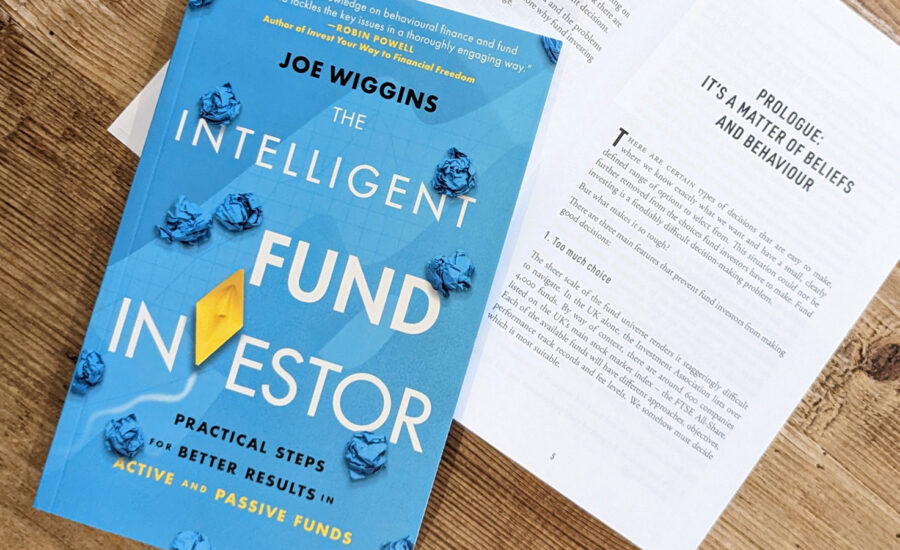Book review: The Intelligent Fund Investor by Joe Wiggins
Selecting funds based on past returns, stories about “the next best thing” and so on can be costly mistakes. This book explains why, so you can avoid them.
Advertisement
Selecting funds based on past returns, stories about “the next best thing” and so on can be costly mistakes. This book explains why, so you can avoid them.

Wow! I just finished Joe Wiggins’ new book, The Intelligent Fund Investor (Harriman House, November 2022). What a great read—I’d recommend it for both DIY and professional investors. There’s no fluff, and I comfortably read through every chapter, right to the end—something I don’t always do.

As the book’s title suggests, this is about fund investing, which includes exchange-traded funds (ETFs). And Wiggins sets out to answer the question: “What does it take to be an intelligent fund investor?”
All you need is a sound set of beliefs supported by evidence and the ability to manage your own behaviour, he writes. And that’s it. Possessing those two elements will position you for a successful investment experience.
Using evidence and entertaining anecdotes, Wiggins justifies his position through 10 compelling chapters. Here are their titles below. As you read them, I encourage you to reflect upon your investment experiences and consider how each chapter may relate to you. What do you think?
What I enjoyed most about Wiggins’ book is its breadth of scope, unlike many other books that focus on a singular theme, such as index investing. He also had me thinking differently about a few investment concepts.
I found it interesting that he suggests investors should consider holding a mix of index and low-cost active funds. My understanding is that Wiggins considers an active fund as anything that is not an index fund ranked by capitalization (the number of shares outstanding times the share value).
He explains that many people pull up the SPIVA (S&P Indices versus Active) report to support the premise that indexing beats active investing over time. But there is no context behind the numbers.
As he points out, when the largest capitalized companies in the index, Apple as an example, are the top-performing stocks, it is very difficult for an active fund to beat the index. Active funds, according to Wiggins, have the best chance at beating the market when an equally weighted index is returning better than an index ranked by capitalization.
He brings this point home with a story about two fishermen. One is skilled at fishing in a pond with very few fish, while a beginner is angling in a pond teeming with fish.
When I read that story, I thought he is right. If we think of the fish as rates of return, we’d assume the beginner fisherman is the better fisherman or fund manager because they caught more fish.
The anecdote also made me think of the investment funds that did well from 2020 to 2022, during the COVID lockdowns. Did they do well because they had skilled investment managers? Or just because the pond they were fishing in was restocked? How many investors do you suppose saw those great returns by the tech-heavy growth funds and switched into those funds?
Wiggins gives three reasons to explain why chasing returns is a bad idea.
Later in the book, I chuckled when Wiggins provided the outline of a sales pitch for complicated funds, and I’ll add alternatives, because I have seen this presentation many times.
I’m noticing there are now more and more complicated investment products available to investors. So, when you hear this sales pitch, take a moment to reflect. Are you only purchasing the fund because of strong past returns, or do you have a good understanding of the fund?
Wiggins states that it’s impossible for investors to make informed decisions about funds they don’t and cannot understand. He likens it to a magic act, where investors are just waiting for the rabbit (returns) to be pulled from the hat.
Often associated with complicated investment products are incentive fees, which can be presented in a way to make them look good.
There is a base fee, and if the fund is doing well, the fund manager will charge more. However, as Wiggins points out, they don’t reduce the base fee when the fund is doing poorly. This can lead to a higher-than-average fee over the long run.
If you want to be more aware as an investor and make better fund decisions, this is one of the better books I have read—and I have read more than a few.
I know most MoneySense readers have concerns about higher fees, and you’ll find that, at $46.99, this book is a little more expensive than the average investment book. But this isn’t an average book, and it’s worth the extra cost.
Allan Norman provides certified financial planning services through Atlantis Financial Inc. Allan conducts securities-related business through Aligned Capital Partners Inc. (ACPI). ACPI is regulated by the Investment Industry Regulatory Organization of Canada (IIROC.ca). Allan can be reached at atlantisfinancial.ca or [email protected].
Share this article Share on Facebook Share on Twitter Share on Linkedin Share on Reddit Share on Email